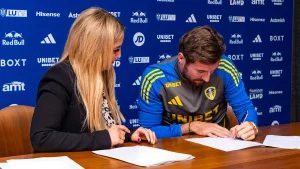
Breaking News: Daniel Farke resigns from Leeds United following allegations of mismanagement…….
In a shocking development that has sent ripples through the world of football, Daniel Farke has resigned as the head coach of Leeds United, effective immediately. The decision follows a series of explosive allegations of mismanagement within the club, which have raised serious questions about the former Borussia Mönchengladbach manager’s methods, leadership, and relationship with key players. Farke, who took charge of the Yorkshire side in the summer of 2023, leaves behind a team struggling to find form in the Championship after relegation from the Premier League last season.
The Rise and Fall of Daniel Farke at Leeds United
Daniel Farke’s appointment as Leeds United’s head coach in the summer of 2023 was seen as a statement of intent. After a disastrous relegation from the Premier League under Javi Gracia, the club’s hierarchy hoped Farke, with his experience of securing promotions with Norwich City, would provide stability and a route back to the top flight. His track record in guiding Norwich from the Championship to the Premier League twice had earned him a reputation as a manager capable of getting the best out of his squad while playing an attractive brand of football.
Farke was tasked with revitalizing a squad that had been left bruised by the disappointment of relegation. In his first few months, his style of possession-based football seemed to promise a new era for Leeds. However, as the season progressed, doubts began to emerge. Reports of discontent within the dressing room and clashes between the manager and several senior players began to surface. Despite early promises of a return to the Premier League, Leeds’ form remained inconsistent, leading to growing pressure on Farke and the club’s ownership.
The Allegations of Mismanagement
The breaking point for Farke came after a series of high-profile allegations surfaced regarding his management style, tactical decisions, and ability to handle key players within the squad. The first sign of trouble came when several members of the Leeds dressing room reportedly expressed dissatisfaction with Farke’s training methods. Sources within the club claim that the team felt the training sessions lacked intensity and did not focus enough on the tactical aspects needed for Championship football. Some players felt that Farke’s philosophy, which had worked in the Premier League with Norwich, was not adapted to the rigors of the Championship.
Additionally, there were claims that certain senior players felt marginalized under Farke’s regime. Star player Willy Gnonto, along with captain Liam Cooper, were said to have been frustrated by their roles in the team, leading to a tense atmosphere in the dressing room. Sources close to the club suggested that Farke’s reluctance to involve some of the club’s most experienced players in crucial matches was a major point of contention.
There were also reports of communication issues between Farke and the club’s board. Allegedly, Farke had expressed frustration with the club’s recruitment strategy, which he felt was not aligned with his tactical vision. Despite bringing in several new faces in the summer, including striker Joe Gelhardt and midfielder Michael Duffy, Farke’s preferred style of play seemed at odds with some of the acquisitions. The club’s hierarchy, in turn, was reportedly growing concerned that Farke’s inability to make the most of the squad was leading to underperformance.

In a particularly damning report, it was claimed that Farke had clashed with Director of Football, Victor Orta, over transfer strategy. Farke’s frustration with the club’s recruitment process, which he reportedly felt lacked sufficient input from him, was seen as a sign of growing disharmony behind the scenes.
The Final Straw: Poor Results and Internal Conflict
Despite a promising start to the season, Leeds United’s form quickly began to slide, leading to increasing pressure on Farke. The club’s results were inconsistent, with a string of disappointing draws and losses against mid-table teams in the Championship. The team’s struggles were compounded by several injuries to key players, including midfielder Adam Forshaw and striker Patrick Bamford, both of whom had been pivotal in the club’s Premier League survival campaigns in previous years.
While injuries are often a part of football, the overall lack of tactical flexibility seemed to exacerbate the situation. Leeds appeared unable to adapt to the unique challenges of the Championship, where the intensity and physicality of the game often demand a more pragmatic approach. Farke’s insistence on playing an expansive, possession-based style was proving ineffective against teams that relied on direct football and quick counter-attacks. The lack of a Plan B, along with a failure to tighten up defensively, led to mounting frustration among fans, the media, and most crucially, the board.
Internal friction also seemed to play a role in the deteriorating relationship between Farke and the senior players. Reports began to circulate that Farke’s refusal to compromise on his tactical philosophy alienated certain players, leading to a lack of motivation and focus in key fixtures. Leeds were unable to string together consecutive wins, and as a result, Farke’s position began to look increasingly untenable.
Leeds United’s Statement on Farke’s Resignation
In an official statement released shortly after Farke’s resignation was confirmed, Leeds United expressed their regret at the manager’s departure but emphasized the need for a change in direction.

“We would like to thank Daniel Farke for his efforts during his time with Leeds United. Daniel has worked hard to bring a new style of play to the club, but following recent discussions with both the management team and key figures within the squad, it has become clear that a change is required to move forward. We wish Daniel all the best in his future endeavors,” the club statement read.
The resignation is expected to spark further upheaval at Elland Road, as Leeds United now faces a crucial decision about the future of the team. With the club currently mid-table in the Championship, the board will need to act quickly to secure a replacement who can lead the club back to the Premier League and rebuild team morale.
The Impact on Leeds United’s Future
Farke’s departure leaves Leeds in a precarious position. Despite the club’s high-profile status and financial backing, their failure to gain promotion back to the Premier League at the first attempt would be seen as a significant setback. The Championship is notoriously difficult to navigate, and Leeds will face stiff competition from clubs such as Sheffield United, Middlesbrough, and Ipswich Town in the race for promotion.

The club’s owners, led by Andrea Radrizzani, will need to act decisively. Leeds United’s fortunes could depend on the appointment of a manager who can revive the squad’s morale and restore confidence. The next few weeks will be crucial as the club seeks to appoint a successor who can inspire the team and bring about a rapid change in fortune.
Farke’s resignation has also raised questions about the long-term future of several senior players. The likes of Gnonto, Cooper, and even captain Liam Cooper, whose future had seemed uncertain under Farke, may now reassess their own positions within the club. Whether they stay or seek new opportunities in January could determine the balance of power in the Leeds United dressing room moving forward.

Possible Replacements: Who Will Take the Helm at Leeds?
In the wake of Farke’s resignation, several names have emerged as potential candidates to take over at Leeds United. The club’s board will be looking for a manager with experience in the Championship, someone who understands the intricacies of the league and can inspire a squad that is currently underperforming.
One name that has been mentioned is former West Bromwich Albion manager Carlos Corberán. Corberán, who previously worked as an assistant to Marcelo Bielsa at Leeds, has experience in the Championship and is known for his tactical acumen. His familiarity with the club’s culture and his ability to work with young players could make him a strong candidate.
Another possibility is Chris Wilder, the former Sheffield United boss who has a proven track record of getting teams promoted from the Championship. Wilder’s direct and no-nonsense approach could resonate with the Leeds players, who have been criticized for lacking discipline under Farke.
Other names that could be in the frame include Nigel Pearson, the experienced former Leicester City and Bristol City manager, and former Swansea City boss Russell Martin, who has built a reputation for playing attractive football while working with limited resources.
What Does This Mean for the Future of Leeds United?
The resignation of Daniel Farke represents a crucial crossroads for Leeds United. The club now faces an uncertain future, with questions about the squad, leadership, and their ability to return to the Premier League in the near future. The next managerial appointment will be vital in shaping the future trajectory of the club, and fans will be watching closely to see how the board responds to this crisis.
Leeds United’s fortunes have taken a significant blow, but with the right leadership, the club could still navigate a difficult Championship campaign and rebuild for the future. The club’s next steps will be watched closely, not only by Leeds fans but by the entire footballing world.





